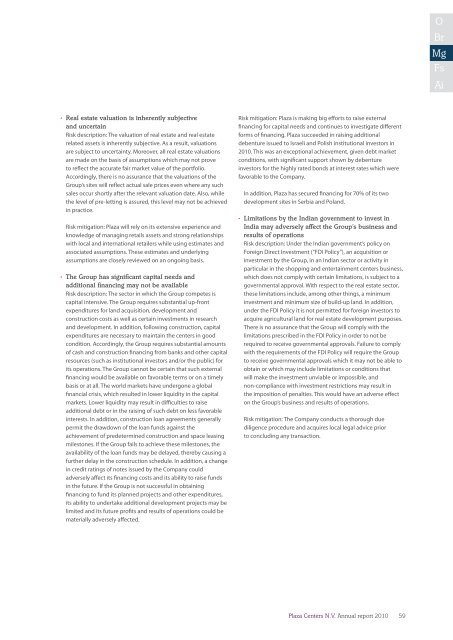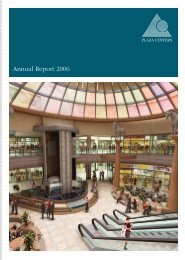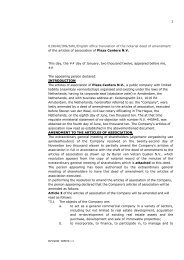Annual report 2010 - plazacenters
Annual report 2010 - plazacenters
Annual report 2010 - plazacenters
You also want an ePaper? Increase the reach of your titles
YUMPU automatically turns print PDFs into web optimized ePapers that Google loves.
O<br />
Br<br />
Mg<br />
Fs<br />
Ai<br />
• Real estate valuation is inherently subjective<br />
and uncertain<br />
Risk description: The valuation of real estate and real estate<br />
related assets is inherently subjective. As a result, valuations<br />
are subject to uncertainty. Moreover, all real estate valuations<br />
are made on the basis of assumptions which may not prove<br />
to reflect the accurate fair market value of the portfolio.<br />
Accordingly, there is no assurance that the valuations of the<br />
Group’s sites will reflect actual sale prices even where any such<br />
sales occur shortly after the relevant valuation date. Also, while<br />
the level of pre-letting is assured, this level may not be achieved<br />
in practice.<br />
Risk mitigation: Plaza will rely on its extensive experience and<br />
knowledge of managing retails assets and strong relationships<br />
with local and international retailers while using estimates and<br />
associated assumptions. These estimates and underlying<br />
assumptions are closely reviewed on an ongoing basis.<br />
• The Group has significant capital needs and<br />
additional financing may not be available<br />
Risk description: The sector in which the Group competes is<br />
capital intensive. The Group requires substantial up-front<br />
expenditures for land acquisition, development and<br />
construction costs as well as certain investments in research<br />
and development. In addition, following construction, capital<br />
expenditures are necessary to maintain the centers in good<br />
condition. Accordingly, the Group requires substantial amounts<br />
of cash and construction financing from banks and other capital<br />
resources (such as institutional investors and/or the public) for<br />
its operations. The Group cannot be certain that such external<br />
financing would be available on favorable terms or on a timely<br />
basis or at all. The world markets have undergone a global<br />
financial crisis, which resulted in lower liquidity in the capital<br />
markets. Lower liquidity may result in difficulties to raise<br />
additional debt or in the raising of such debt on less favorable<br />
interests. In addition, construction loan agreements generally<br />
permit the drawdown of the loan funds against the<br />
achievement of predetermined construction and space leasing<br />
milestones. If the Group fails to achieve these milestones, the<br />
availability of the loan funds may be delayed, thereby causing a<br />
further delay in the construction schedule. In addition, a change<br />
in credit ratings of notes issued by the Company could<br />
adversely affect its financing costs and its ability to raise funds<br />
in the future. If the Group is not successful in obtaining<br />
financing to fund its planned projects and other expenditures,<br />
its ability to undertake additional development projects may be<br />
limited and its future profits and results of operations could be<br />
materially adversely affected.<br />
Risk mitigation: Plaza is making big efforts to raise external<br />
financing for capital needs and continues to investigate different<br />
forms of financing. Plaza succeeded in raising additional<br />
debenture issued to Israeli and Polish institutional investors in<br />
<strong>2010</strong>. This was an exceptional achievement, given debt market<br />
conditions, with significant support shown by debenture<br />
investors for the highly rated bonds at interest rates which were<br />
favorable to the Company.<br />
In addition, Plaza has secured financing for 70% of its two<br />
development sites in Serbia and Poland.<br />
• Limitations by the Indian government to invest in<br />
India may adversely affect the Group’s business and<br />
results of operations<br />
Risk description: Under the Indian government’s policy on<br />
Foreign Direct Investment (“FDI Policy”), an acquisition or<br />
investment by the Group, in an Indian sector or activity in<br />
particular in the shopping and entertainment centers business,<br />
which does not comply with certain limitations, is subject to a<br />
governmental approval. With respect to the real estate sector,<br />
these limitations include, among other things, a minimum<br />
investment and minimum size of build-up land. In addition,<br />
under the FDI Policy it is not permitted for foreign investors to<br />
acquire agricultural land for real estate development purposes.<br />
There is no assurance that the Group will comply with the<br />
limitations prescribed in the FDI Policy in order to not be<br />
required to receive governmental approvals. Failure to comply<br />
with the requirements of the FDI Policy will require the Group<br />
to receive governmental approvals which it may not be able to<br />
obtain or which may include limitations or conditions that<br />
will make the investment unviable or impossible, and<br />
non-compliance with investment restrictions may result in<br />
the imposition of penalties. This would have an adverse effect<br />
on the Group’s business and results of operations.<br />
Risk mitigation: The Company conducts a thorough due<br />
diligence procedure and acquires local legal advice prior<br />
to concluding any transaction.<br />
<br />
Plaza Centers N.V. <strong>Annual</strong> <strong>report</strong> <strong>2010</strong>59








